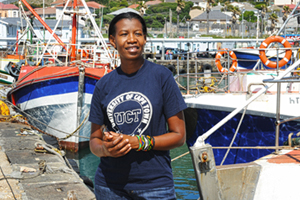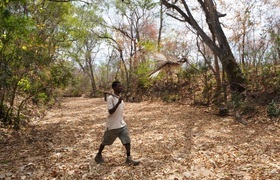Dried fish enterprise gets UN nod
17 February 2014 | Story by Newsroom
An initiative run by a UCT postdoctoral student and aimed at managing food security and narrowing the economic gender gap in Namibia recently won a prestigious United Nations award.
Dr Hilkka Ndjaula's Dried Fish Company (DFC) and its partner the Women's Enterprise Development Initiative (WEDI) were one of the African recipients of the 2013 SEED (Supporting Entrepreneurs for Sustainable Development) Awards.
The awards support innovative social and environmental start-up enterprises, which can tackle key sustainable development challenges at community level in developing and emerging markets.
"Ninety percent of the fish caught in Namibia is exported. There is also a tradition of drying food. So, by drying fish, we hope to help more Namibians benefit from the country's fishing industry," says Ndjaula, who together with another entrepreneur, Mrs Alushe Nditya, founded DFC in 2012.
Ndjaula is from the northern part of Namibia, which although more populous than the coast, is most subject to droughts and floods. "Drying fish not only ensures food security, but could provide much needed employment for unskilled workers," she maintains.
Her postdoctoral studies in marine biology revolve around the population dynamics of small pelagic fish, like sardines and anchovies. Her doctorate and masters were completed in Norway and also focussed on marine biology.
When asked about her interest in fish when she is originally from the Namibian interior, she answers, "I always wanted to do research. My undergraduate majors were zoology and chemistry. During these studies we undertook excursions to the coast, where my interest in fish started. After obtaining my degree I got my first job at the Namibian Ministry of Fisheries, where my interest was cemented."
DFC purchases frozen horse mackerel from Namibian factories and dry it using solar energy processes. The dried fish is then transported in bulk to outlets run by WEDI, a women's cooperative, which has exclusive distribution rights and whose focus is on rural areas.
Due to a lack of funds, the company currently operates on a very small scale, but the US$5 000 (R55 000) plus business and other support they are getting as a result of their success at the SEED awards could change all that.
"My dream is that our model be replicated in other coastal African countries, where people go hungry even when there is a lot of fish. We would also like to expand to include the drying of other foods because in Africa there is a tradition of eating dried food."
Story by Abigail Calata. Image by Michael Hammond
 This work is licensed under a Creative Commons Attribution-NoDerivatives 4.0 International License.
This work is licensed under a Creative Commons Attribution-NoDerivatives 4.0 International License.
Please view the republishing articles page for more information.










